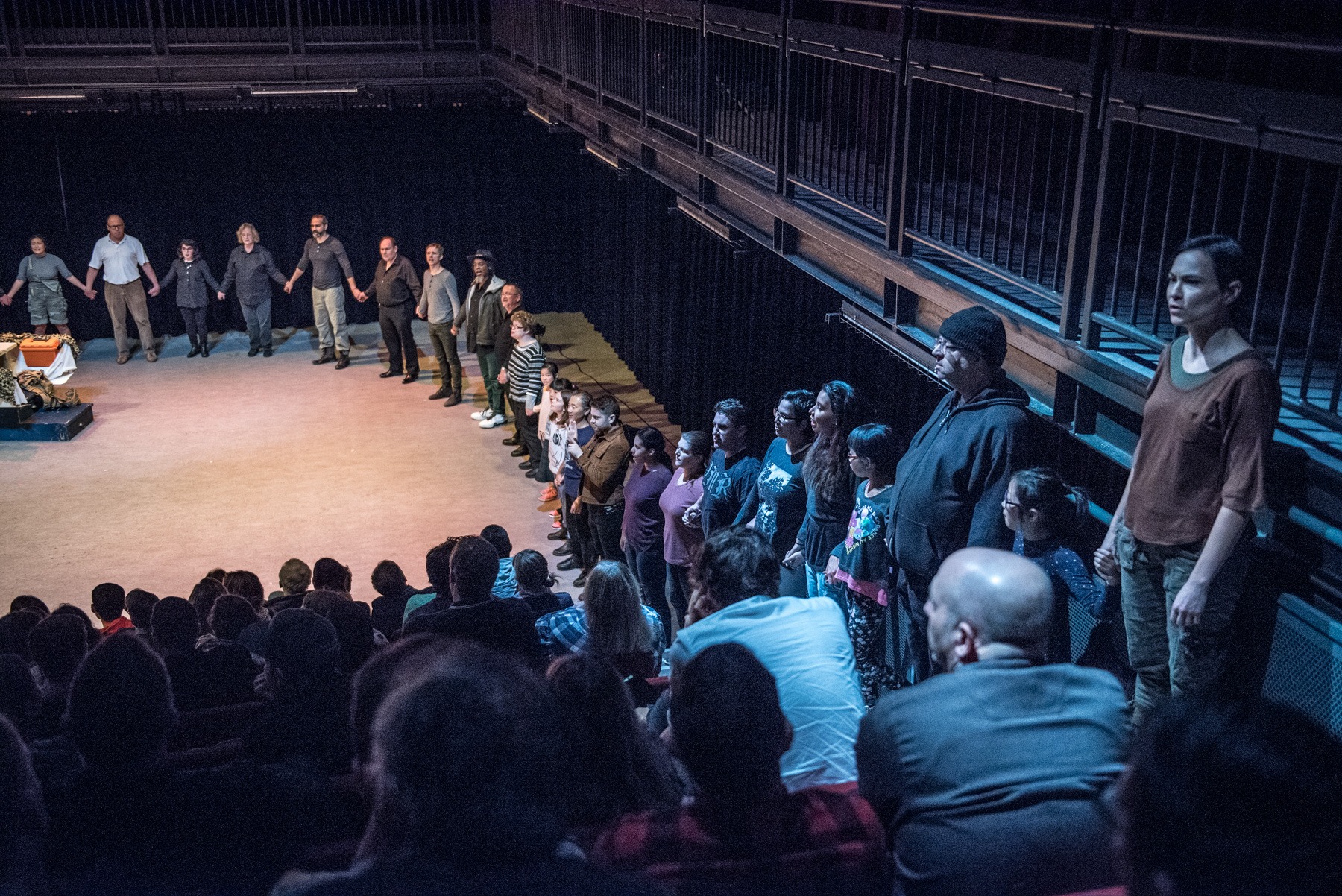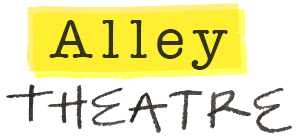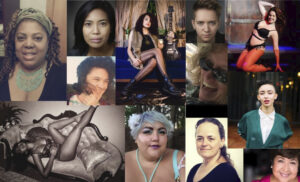
Alley Theatre Engagement Framework
... a living document ...
Engagement: Pathways to healthy collaboration and partnerships
Opening Statement
Alley Theatre is an independent theatre company based on the unceded territories of the Coast Salish peoples of the xʷməθkwəy̓əm (Musqueam), Skwxwú7mesh (Squamish), and Səl̓ílwətaɬ (Tsleil-Waututh) Nations. The organization was founded in 2008 and registered as a non-profit society in 2011 by myself (Marisa Emma Smith) and my husband Daniel Arnold. Our ancestors come from various countries in Europe and we were both raised by middle class families in small towns in what are now called BC and Alberta.
Through Alley Theatre we are able to produce plays largely through successful project grants received from various levels of government. With this funding, we strive to produce professional theatre that shines light on stories not often told. This means that we sometimes make theatre that engages with subject matter or themes beyond our own lived experiences.
Over the years we have come to understand the shameful legacy created through colonization and cultural genocide, and how we have been sheltered and benefited from such racist structures. So as artists we work to hold up stories and support fellow artists whose work we feel needs to be shared, in a small effort toward bringing equity to our community.
In this work, we have had successes and made mistakes. We know good intentions are not enough. Above all we want to be respectful to the artists and communities that we work with which, to us, means being aware of certain privileges and biases we carry, assuming nothing, seeking continual feedback and collaboration, and maintaining honesty and integrity in our working relationships.
We initiated this engagement framework in 2018 with a successful application to the BC Arts Council. The idea was to create a framework through which we, and those we work with, could hold ourselves accountable. This framework is now the culmination of a year of community discussions and brainstorming sessions and it is meant to be a “living document” which can and will change over time, as we continue to receive new understanding and receive feedback from readers such as you. If you would like to give feedback on this living document, please email info@alleytheatre.ca.
We understand that each individual and/or group will have specific needs which might not be specifically mentioned here. This document is meant to be general framework from which we can dig deeper with individual projects. We are also incredibly grateful to all who have contributed to the creation of this framework so far and we look forward to its continued evolution. See Acknowledgments for details on the participants who helped shape this framework.
We believe:
Building healthy relationships takes time with ongoing evaluation and action.
No one engagement strategy is right for all individuals, groups, or communities.
There is value in devising performances in collaboration with people of different cultural backgrounds and lived experiences because it in turn gives audiences opportunities to empathize and connect with experiences that are different from their own. This understanding builds stronger communities.
We commit to:
Questioning our assumptions, developing our knowledge, creating realistic goals, and evaluating our process to foster an equitable and inclusive work environment.
Using this Framework to help guide decisions and inquiries for all aspects of the organization, including hiring and engaging with artists, community groups, audiences, and board members.
Sharing the Framework with those who intend to work with our organization.
Taking time to ensure all members of the organization understand and are committed to the Framework.
Whom is this framework for?
Administration
Artists and Production team (including performers, designers, stage managers, etc)
Board of Directors
Community members
Patrons / Audience
The 5 Rs
This framework is guided by the Indigenous principles of Respect, Reciprocity, Responsibility, Relationality, and Relevance. (This section is inspired from the Indigenous Ways of Knowing and Being chapter in A Guide for Front-Line Staff, Student Services, and Advisors. References also from Maaj Consulting Group and Indigenous Epistemologies and Pedagogies.)

RESPECT
Respect and value the individuals and communities being engaged for who they are, where they come from, their lived experiences, their knowledge, their protocols, and their view of the world.
RECIPROCITY
Reciprocity is the embodiment of a two-way process of learning and understanding. The relationship is built on the understanding of mutual self-determined benefit. Each relationship honours the knowledge and gifts that each person brings to the table.
RESPONSIBILITY
Taking responsibility means understanding the potential impact of one’s motives and intentions on oneself and the community. We are responsible for our own actions, while also for understanding the complex history, systems, power, and privilege (or lack of) afforded to the majorities or taken from the minorities of varying identities in the community.
RELATIONALITY Relationality is the concept that we are all related to each other, to the natural environment, and to the spiritual world, and these relationships bring about interdependencies. In order to take care of ourselves, we must take care of others.
RELEVANCE
Ensure engagement is relevant to the community and individuals being approached. Relevance must not be perceived, instead be acknowledged directly by individuals within the community.
Framework for Engagement[1]
Pathways to re/building relationships
There are many reasons why individuals choose to work or interact with a theatre company such as Alley Theatre. We recognize that there is work to be done prior to entering into these relationships, whether as an artist, administrator, or patron. We recognize that individuals are often on uneven ground layered with different levels of privilege, power, experience, and history of relationships that did not uphold foundations of respect or reciprocity. There are distinct paths taken by Indigenous, Black, and People of Colour; by Deaf/Sumain, Hard of Hearing, Disabled, Mad, and Trauma-Impacted artists[2]; by LGBTQ2+[3] and non-binary individuals; and by other marginalized, underrepresented people in our community. We value honouring their individual experiences.
Laying the Foundation
As we enter new, and some past, relationships on uneven ground, we each should strive to understand how we relate our distinct histories and identities inside the organization and/or project. We recognize that previous broken relationships can cause misunderstandings, stereotypes, lack of trust, and confusion. Everyone participating needs to reflect on their path here and build their readiness for engagement. A healthier environment with a more balanced playing field requires investments (time, energy, financial), so that each person can arrive with the ability to be heard on their own terms.
Preparing for Growth and Maintaining Relationships
Once the foundation has been mutually prepared, we are ready to come together to begin a dialogue based on the understanding of some shared context, ideas, interests, and plans. Relationships shall not be neglected once they begin to grow; they take constant work and care to maintain with honesty, openness, and action.
Making Mistakes
Mistakes will happen. While striving to minimize the weight of those mistakes by any person and on any person, persons, or community, mistakes are part of a process in which the deepest learning can happen. Recognizing the mistake is the first of many steps toward taking accountability and healing. A high level of self-reflection and learning by all involved, as well as taking responsibility for one's actions can start to rebuild trust.
On The Ground - Framework in Action
Overall - We strive to...
- Work with the qualities of “accountable kindness”.
- “Be a good guest” when visiting or working on any/all Indigenous territories, and other cultural territories which includes doing homework and acknowledging the land we are on, the venue in which we work, and the cultural group with whom we are engaged.
- Offer snacks and liquids when hosting a meeting, gathering, rehearsal, etc, taking into account dietary needs, food sensitivities, duration of meeting, and communicated expectations.
- Hire a dedicated person (eg. cultural advisor) when specific cultural teachings or knowledge is required. We will not expect existing staff or artists to fill the need that goes beyond their contracted responsibilities, unless they are additionally contracted to undertake this additional responsibility.
- Hire a neutral third-party facilitator/mediator, or an Indigenous or cultural Elder, if a conflict arises and a solution or agreement cannot be made through direct communication.
- Make time and take time to build authentic relationships with Indigenous and non-Indigenous Elders, knowledge keepers, and cultural speakers.
- Understand and acknowledge mistakes, and take appropriate steps to make amends. This may include apologies in private or public; or culturally specific feast or gifting.
- Build knowledge and understanding amongst all individuals involved with the organization to hold space for each other.
For Artists and Personnel, we strive to...
- Make time and take time to build relationships to learn about the person we will be engaging, including their individual cultural protocols (eg. smudging).
- Be proactive while addressing the needs of our collaborators when working within the context of larger institutions (eg performance or rehearsal spaces).
- Understand individuals are not responsible for educating others about their own culture and lived experience, unless negotiated in advance.
- Be transparent and clear in the working relationship, including remuneration, deadlines, and deliverables. Adjustments will be negotiated when needed.
- Discuss and negotiate their needs and wishes, which may include, but is not limited to: salary/fees, timelines, opportunity to select collaborators by consensus (including directors, designers, performers, etc), individual and cultural protocols, and specific language reflected in the contract.
- Offer check-in and check-out circles for rehearsals in order to connect and build trust within the group.
For Events/Performances, we strive to...
- Invite an Indigenous Elder to open (and close) events; where the Elder will be given a territorial-appropriate gift (eg. honourarium and/or others)
- Invest time and resources toward ASL interpretation, captions, surtitles, and audio descriptions.
- To work and present in accessible and low barrier spaces for artists and audiences.
- Communicate accessibility details (including restrictions) when promoting activities.
- Provide low-cost or free tickets for low-income community members.
Shared Indigenous Teachings
Select quotes and thoughts captured from the Indigenous consultation sessions.
- Community and Culture go hand in hand
- Marry the honesty of who we are to the work we do
- Love, honour, respect, trust, truth, compassion, patience. 7 Values as Nyla Carpentier was taught by Eddie King, Odawa)
- “Everyone has value, the creator does not make junk” - Eddie King
- “Whatever your shadow touches, you must be compassionate towards it” - Eddie King
Acknowledgements & Process
Consultants Kenji Maeda and Nyla Carpentier developed this Framework document through a process of in-person group and individual consultations, with additional written feedback provided as the document was developed. All participants were provided honourariums. The project was supported by the BC Arts Council Strategic Opportunities program.
The Intercommunity and Inclusive Engagement Framework is a combination of all feedback provided.
We’d like to thank those who contributed in this process: Michelle Bardach, Davey Calderon, Tania Carter, Pedro Chamale, Belle Cheung, Lianne Crowe, Miranda Edwards, Simran Gill, Caroline Hébert, Shizuka Kai, Taran Kootnenhayoo, Greg Labine, Sophie Merasty, Susan Miyagishima, Lissa Neptuno, Odessa Shuquaya, Linda Sum, Rob Thomson, Dominique Wakeland, Yvonne Wallace, Savannah Walling, Kelsey Wavey, Kaitlyn Yott, Nimkish Younging, and Elders Larry Grant (Musqueam), Bob Baker (Squamish) and Carleen Thomas (Tsleil-Waututh). For a detailed look at the Indigenous advisor sessions, see the notes below:
Indigenous Consultation Notes Prepared by Nyla Carpentier
North Star (goal)
To cultivate supportive partnerships and relationships when working with Indigenous artists, producing Indigenous work and potential mentorship with Indigenous artists.
This work came about after Alley Theatre made a few mistakes and so it became a learning opportunity to embark on this project. With help from Nyla Carpentier gathering information and laying the groundwork. This is meant to be a living document so there's always room for it to grow ie in case I (Nyla) missed something, someone or need to add some info.
We are grateful to the Elders who took the time from their visit busy day to talk with us, Larry Grant (Musqueam), Bob Baker (Squamish) and Carleen Thomas (Tseil Watuth). Thank you for sharing your knowledge in shaping this document.
We are grateful to the Indigenous artists who took the time to share their experiences with us so we could build upon this document, Michelle Bardach, Yvonne Wallace, Kelsey Wavey, Odessa Shuquaya, Rob Thomson, Nimkish Younging, Taran Kootnenhayoo and Kaitlyn Yott.
Shared Teachings:
- Community and Culture go hand in hand
- "Marry the honesty of who we are to the work we do"
- Respect, Responsibility, Relevance, Relationality and Reciprocity (5 R's Values)
- Love, honour, respect, trust, truth, compassion, patience (7 Values as Nyla was taught by Eddie King, Odawa)
- Everyone has value, the creator does not make junk - Eddie King
- Whatever your shadow touches, you must be compassionate towards it - Eddie King
Alley Theatre values: Justice, fairness, socialism, the personal is political, freedom of choice, joking, authenticity, accountability, self-questioning or questioning assumption, self-awareness, respect, social gatherings
Protocols:
- Being a good guest when in different territories.
- doing the groundwork or homework about the territory you reside and about the artist(s) you will be engaging
- Alley Theatre will ask an Indigenous Elder to open events and if possible close events. The Elders will be gifted with an honourarium.
- When gifting Indigenous Elders, know the territory where they are from so to give the appropriate gifts.
- Working with accountable kindness
- being aware of different protocols some Indigenous artist have (ie: smudging, feasting) and will to go to bat for them in larger intuitions (Theatre space or even rehearsal space)
- Transparency, Alley Theatre will be clear in the working relationship with the Artist about remuneration, deadlines and the work expected. If more work is required then originally discussed the company will financially compensate the artist accordingly.
- The Artist is able to negotiate fees, ask for more time and choose collaborators.
Actions:
- Alley Theatre will take the time to build relationships with Indigenous Elders
- Alley Theatre will take the time to build relationships with the Artists they are engaging.
- Alley Theatre will do the ground work and educate themselves plus other non-Indigenous collaborators so that the Indigenous artist can focus on the project at hand.
- When drafting a contract or LOA, being able to adapt the language used so that it suits the artist.
- Provide snacks and liquids when having a meeting, gathering, rehearsal etc. It's good to feed the artistry.
- Alley Theatre will make sure that a project is fully funded for it to succeed and to allow for creation.
- A cultural consultant will be hired instead of expecting Indigenous actors to provide cultural knowledge that goes beyond their role in a project.
- The artist has first choice in collaborators, directors and designers. The company will advise on the collaborators though the final decision belongs to the artist.
- Check in and Checking out circles will be part of the rehearsal process
- Calling in a neutral third party or an Indigenous Elder if problems arise with the project to see if a solution or agreement can be made.
- Calling in members of the cast if there is conflict and bringing in support like an Elder to help deal with the conflict.
- If a mistake is made, then Alley Theatre will take the appropriate steps to make amends which includes admitting the mistake and a public apology.
- Depending on the error and the advice of an Indigenous Elder, a special feast or gifting may take place to acknowledge the error and make it right.
- Alley Theatre acknowledges that life events (death, illness, mental health) can happen and will allow for projects to be postponed
- One of the key elements from the discussions is that Non-Indigenous led theatre companies must allow the time and space for projects to happen. As well respect the process of Indigenous artists. Performing artists need time, space and financial resources.
- The leadership roles need to be shared.
- As well Everyone (Indigenous and Non) need to be open to discussion and communication about what they need from each other when it comes to a creative project.
FOOT NOTES
[1] Inspired by Seeding Reconciliation on Uneven Ground: The 4Rs Approach to Cross-Cultural Dialogue (by the The 4Rs Youth Movement)
[2] Adapted using The Deaf, Disability, Mad Arts Alliance of Canada’s DDMSTCA abbreviation -- Deaf/ deaf/ hard of hearing; Disabled, person with a disability; Mad/ mentally ill, psychiatric care survivor; Sick/ Spoonie/ Survivor; Trauma-Impacted (social/ relational/ inherited/ intergenerational/ environmental/ transnational/ interpersonal); Colonized; Artistic practice & Aesthetic non-normativity.
[5] LGBTQ2S
acronym is used to refer to Lesbian, Gay, Bisexual, Trans, Queer and Two-Spirit (2S) people. Additional letters, or a + sign, are sometimes added to this acronym (i.e. LGBTQ+, LGBTQI2S+, etc.). Referenced from Qmunity’s 2018 Edition Queer Terminology from A to Q.






